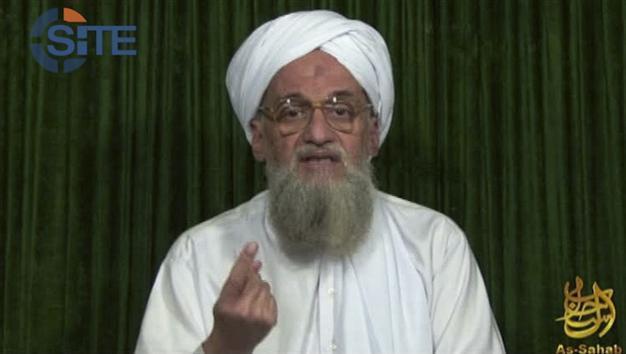Al-Qaeda tells Syria fighters to shun secularists in sign of deeper rebel rift
DUBAI - Reuters

This file image from video the AP obtained Feb. 12, 2012, from the SITE Intel Group, an American private terrorist threat analysis company, authenticated based on details in it, shows al-Qaida's leader Ayman al-Zawahri in a web posting by al-Qaida's media arm, as-Sahab, calling on Muslims across the Arab world and beyond to support rebels in Syria who are seeking to overthrow President Bashar Assad. AP photo
Al-Qaeda leader Ayman al-Zawahri has told the Islamist militants who are some of Syria’s toughest opposition forces to avoid alliances with other rebel fighters backed by Gulf Arab states and the West.
His comment reflects a deepening rift between groups of the Western- and Arab-backed Free Syrian Army (FSA) and militants sympathetic to al-Zawahri’s ultra-hardline network, which seeks to wage a transnational armed campaign against the West.
Division among rebel fighters, as well as the influence of hardline Islamists, is one reason Western powers have hesitated to intervene in Syria’s two-and-a-half-year-old conflict.
In an audio speech released a day after the 12th anniversary of the 9/11 strikes, al-Zawahri said the United States would try to push opposition fighters to link up with “secular parties that are allied to the West,” the SITE monitoring service said.
“I warn my brothers and people in the Syria of unity and jihad against coming close to any of these groups,” he said. A full translation of al-Zawahri’s remarks, containing the passage on Syria, was published by SITE yesterday.
Al-Zawahri’s language makes clear he is referring to the FSA. Even though not all of the FSA’s constituent groups are secular, its acceptance of support from the West and Gulf Arab monarchies renders it illegitimate in the eyes of al-Qaeda.
Rivalries have been growing between the FSA and the Islamists, whose smaller but better trained and equipped forces control most of the rebel-held parts of northern Syria. The two sides have fought together from time to time, but the FSA, desperate for greater firepower, has recently tried to distance itself to ease U.S. fears any arms it might supply could reach al-Qaeda.
In July, al-Qaeda-linked militants assassinated one of the top FSA commanders, Kamal Hamami, in a demonstration of just how damaged relations have become.
